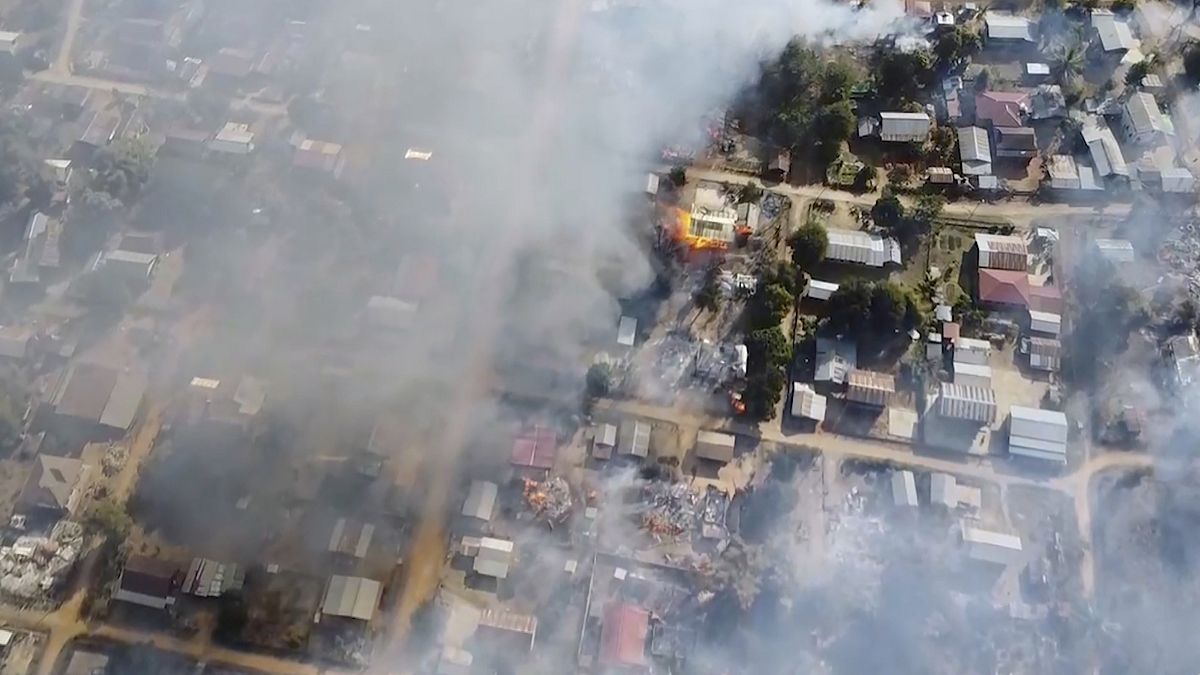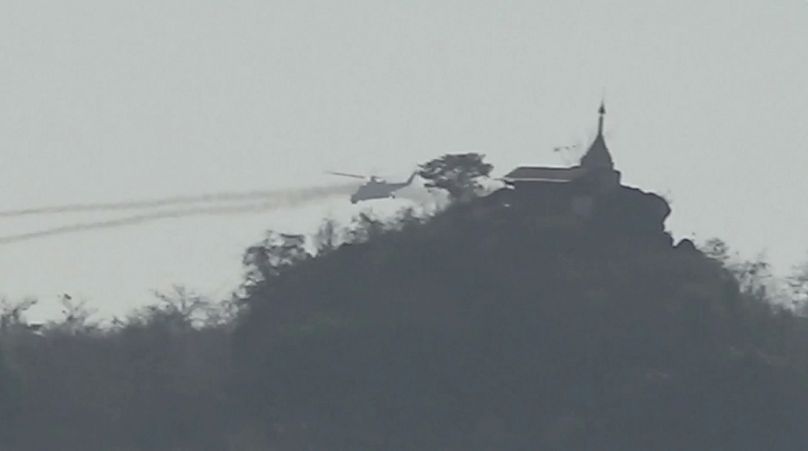Activists and exiles urge European leaders to keep up the pressure on the military junta even as the conflict in Ukraine dominates headlines.
On February 21, the European Union imposed its fourth round of sanctions on the military junta that ousted Myanmar’s democratically-elected government in 2021.
Going further than the US, Brussels sanctioned the country’s state-run oil and gas behemoth, the Myanmar Oil and Gas Enterprise, a major revenue earner for the junta.
Three days later, Russia invaded Ukraine.
As respresentative of Myanmar's exiled National Unity Government (NUG) in the Czech Republic, Linn Thant is concerned that the war in Ukraine will distract Europe's attention from the situation in Myanmar.
A former political prisoner who spent 20 years in jail in Myanmar for his role as student leader during the 1988 uprising against a previous military government, Thant directs anti-junta activism across Europe from his small apartment in Prague. He, like everyone in Myanmar, is watching events in Ukraine closely.
More than a year on since the coup, which overthrew the elected government of Aung San Suu Kyi, the junta is struggling to make gains, despite jailing its political opponents and launching scorched-earth tactics against rebel communities. More than 1,600 civilians have now been killed by security forces since the putsch, according to the Assistance Association for Political Prisoners, an independent Thailand-based activist group.
Large swathes of the country have resisted military control. Several ethnic insurgent groups have joined the fight against the junta, some cooperating with the civilian militia, the people’s defense forces, who took up arms last year after the NUG called for a “people's revolution”.
As many Burmese continue with their resistance against a military regime — which counts Vladimir Putin, the Russian president, as a loyal ally — “they stand in solidarity with the people of Ukraine and are praying for the people of Ukraine,” said Thant. “Even in our most trying times, we are sustaining our sense of humanity.”
But he appealed to the EU not to “forget the people of Myanmar who are suffering and facing brutal violence everyday”, directed by junta leader Min Aung Hlaing, “Putin's puppet” in Asia.
This week, the European Parliament passed a resolution reaffirming its position on the Myanmar crisis. On March 10, the European Commission’s vice-president for values and transparency, Věra Jourová, addressed the chamber on behalf of Josep Borrell, the EU’s foreign policy chief.
“We should not lose sight of this horrifying situation” in Myanmar, she stated, adding that “the crisis in Ukraine does not mean we forget the acute suffering of the people of Myanmar.”
“The European Union keeps all policy options under review, with the aim of supporting the people of Myanmar and bringing the country back to a path towards democracy,” Jourová stated.
Some tangibles were announced. The EU has provided an additional €1m to the UN Independent Investigative Mechanism for Myanmar, a group setup by the UN Human Rights Council in 2018 to collect evidence on human rights violations. Jourová said the EU has allocated €65m for aid to Myanmar, of which €23m was provided in 2021.
She also announced that the EU will present a resolution to the Human Rights Council to ensure the “human rights situation in Myanmar remains high on the agenda of the international community.”
One key recent development was the appointment of Igor Driesmans, the EU’s ambassador to the Association of Southeast Asian Nations (ASEAN) bloc, as the new EU special envoy on Myanmar on February 22. “The EU stands more than ever unequivocally with the people of Myanmar, continuing to strive for a return to democracy,” he told Euronews.
This has been welcomed by Myanmar’s anti-junta groups. “We are hoping that the envoy will play an active role in reminding the governments of the EU about the crisis in Myanmar and atrocities committed by the military junta on its own people,” said Zin Mar Aung, the NUG-appointed foreign minister.
Since his appointment to this new post last month, Driesmans says he has “stepped up diplomatic engagement with all stakeholders”. Last week he visited Cambodia, the current chair of the ASEAN bloc, and he said that he will visit more Southeast Asia capitals over the coming weeks.
He has also been in contact with the UN Special Envoy to Myanmar, Noeleen Heyzer, and other actors outside the country, he said. Borrell, the EU foreign policy chief, has meanwhile maintained contact with different foreign ministers in Asia.
But questions remain as to what more Brussels is willing to do. Although there is pressure on the EU to impose yet more sanctions on the junta, it is by no means clear the EU will do so anytime soon. The latest round came eight months after Brussels imposed its previous tranche.
Brussels seemingly unprepared to change its position on how the crisis can be solved. It and Washignton have trusted ASEAN members with mediating between the rival parties in Myanmar, despite the bloc lacking any real experience of this and most of its members disinterested in involving themselves in the affairs of another country.
Neither the EU, nor the US and Britain appear willing to throw its support behind Myanmar's shadow government, the NUG, despite calls for it to do so. “The EU can recognize NUG as a legal government of Myanmar and can announce Burmese military as a terrorist organization,” said Thant, the shadow’s governments de-facto envoy in Europe. The NUG wasn’t mentioned by Jourová in her speech to the European Parliament on Thursday.
Heidi Hautala, a Green MEP from Finland and a vice-president of the European Parliament, said the legislative “will continue to cooperate and engage with legitimate Myanmar actors”. She recommended that a delegation of MEPs should soon visit Southeast Asia, adding that “we need a better understanding of the situation with humanitarian assistance and how people can access it.”
“The European Parliament will continue to engage with the ASEAN and signal that the situation in Myanmar is taken very seriously. It is crucial that journalists keep covering Myanmar and maintain it on the public agenda,” Hautala said.
Zin Mar Aung, the NUG’s foreign minister, said she understood “Ukraine is important for the European and Western governments due to its geographical position”.
There are major differences in these two crises aside from geography. The coup in Naypyidaw sparked a major refugee emergency, and more 440,000 Burmese people have now been displaced, according to a recent UN estimate. But so far the crisis hasn’t spilled over into neighboring countries.
Russia’s invasion of Ukraine, by comparison, has so far seen more than 2.2 million people flee into central European states, and the localized war could quickly deteriorate into a global conflict. Russia, after all, is a nuclear power.
The Ukrainian president, Volodymyr Zelenskyy, has become a hero in western capitals for his leadership since the invasion. Suu Kyi, Myanmar’s ousted leader, was once the darling of European liberals, but she fell out of favor after she was perceived as defending the military-led genocide of Myanmar’s Rohingya population that began in 2016.
'Enabled by Russia'
Ukraine is a major supplier of food to Europe and a key conduit for energy links, with EU-Ukraine trade worth around €43 billion in 2019, according to European Commission data. Myanmar’s bilateral trade with the EU was worth a trifling, by comparison, €3.1 billion in 2020.
Since the Russian invasion of Ukraine on February 24, Europe has undergone a military “revolution” led by Germany, which will now commit an extra €100 billion to defense spending, potentially soon making it the largest military power in Europe. NATO, the western defensive alliance, no longer appears the morbund grouping it did just months ago.
The coordinated sanctions on Russia have been far more severe and effective than many pundits predicted. The ruble is collapsing, hundreds of Western brands have shut up their stores in the country, and Russians are
By comparison, western sanctions on the Myanmar military and its associated businesses now appear limp. The EU has frozen the assets and imposed travel bans on 65 Burmese officials and 10 entities. There is also the sense that the US and EU did not exert as much effort pressuring their allies in Asia to join in the international sanctions on Myanmar as they did to garner a quick response to Russia’s invasion of Ukraine, analysts say. European partners in the region, including Japan, South Korea and Singapore, have imposed sanctions on Russia but not on Myanmar's military junta.
But Yadanar Maung, a spokesperson for research activist group Justice For Myanmar, said it is “positive” that Western states and their Asian allies acted so swiftly to condemn Russia’s invasion of Ukraine.“We call on them to take a similar stand against the Myanmar military junta, a terrorist organization that flagrantly violates international law,” said Maung.
“In the last week, the Myanmar military has continued its campaign of terror, staging indiscriminate attacks across Myanmar, enabled by the flow of Russian arms,” she added.
Russia has been one of the main providers of weapons to Myanmar’s military since 2018, according to a recently published report by Tom Andrews, the UN’s special rapporteur on human rights in Myanmar. Euronews understands that Belarus, a Russian ally in its war on Ukraine, has recently provided military hardware and material for printing banknotes to the Myanmar junta, although this cannot be independently verified.
As well as the moral imperative, the US and EU shouldn’t overlook the geopolitical importance of events playing out in Myanmar, advises Hunter Marston of the Australian National University, noting that the country lies at the faultline of rivalries between China and India, and is located in the fastest growing economic region in the world.
“Due to our geographical location, it can be more difficult to end the dictatorship and restore democracy in Myanmar,” Aung told Euronews. “Therefore, we ask the governments of the EU and West to resolutely and effectively stand behind Myanmar’s people's revolution.”

